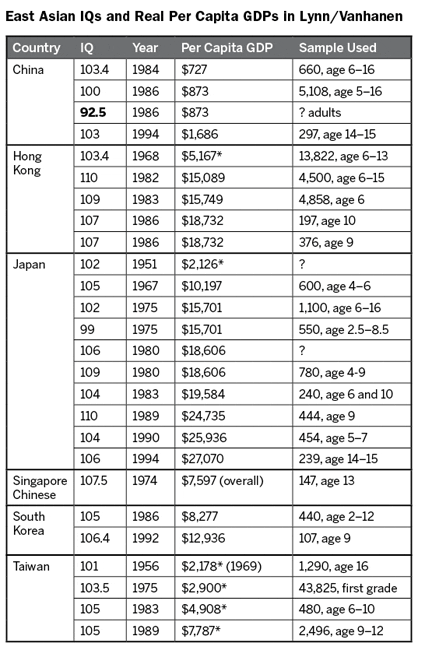Why Asian Americans Excel at Academics
In spite her books receiving praise from conservative news sources, authors like Amy Chua perpetuate the liberal nurture over nature view of human development, or malleability. While liberals and conservatives don’t agree much on politics, they take comfort in this view because it feels empowering to believe, like a religious doctrine, that anyone can covet important skills with enough grit and practice. These authors reap fortune and adulation dangling the carrot of hope before their readers.
Why do some kids score higher on the verbal section than others? Why do some kids consistently turn in ‘A’ quality work and others only get a ‘C’? It’s not because the higher scorers are assiduously studying word lists or putting 10,000 hours of practice – the later which would be physically impossible for a child; instead, they are more capable by virtue of being smarter, allowing them to learn more efficiently. They retain more of the words they read. They learn through osmosis, effortlessly absorbing knowledge and applying it later. This intellectual edge, or Mathew Effect, separates the professionals from everyone else. The 8-year-old that puts in near zero hours of practice and gets A’s has the potential join the ranks of the intellectual, political, business, technology and thought leaders of tomorrow. There are always exceptions, but his odds of becoming someone who shapes the economy instead of being subjugated by it are a lot better than the kid who isn’t smart and struggles.
In today’s hyer-competitive economic environment, the low scoring SAT test-takers of ten years ago are being left behind when looking for work because they are generally not smart enough to attain the skills necessary for a high paying job, or they are being passed up by smarter applicants. This is because the SAT is a better predictor of mental ability than GPA, and employers know this. In contrast to a generation ago, in the smartist era, only the best and the brightest are getting ahead, even for the most mundane positions. The problem is we’re wasting billions of dollars to educate average and below-average students that have dim prospects in this new era. See, while an education is an unalienable right, obtaining a good paying job isn’t.
We also need to stop beating around the bush and accept the limitations of parenting as a determinant of outcomes, instead of deluding ourselves because we cannot accept the truth.
Study habits and parenting are only part of the equation. With parenteral aid, a dull student can do well on homework but this is of little use for tests which require memorization and the absence parental help, without which less intelligent students are left to drown. This is because less intelligent students, including those with ‘tiger moms’ , are incapable of memorization or drawing relations between disparate pieces of data as readily as smarter students. That’s what it boils down to. There’s no tricks, no cramming, no tiger moms – just raw brainpower to mentally crystallize the concepts and regurgitate them on test day. Working memory is often tested as part of IQ tests. The WAIS-IV specifically tests memory span and visuospatial memory directly, and audioverbal memory indirectly. Other definitions of intelligence may de-emphasize memory in relation to intelligence, they still include working memory as a component. As shown below, East Asians score higher than any other ethnic group:

But what about the threat of violence and the anecdotal evidence of overbearing Asian parents that berate their kids for getting poor grades?
Someone commented:
Asian students often excel because their PARENTS will beat their ASSES if they stop studying. I had a Korean friend in high school whose parents had forced him to take SAT classes since THIRD GRADE -and he ended up with a 1580/1600 on the old-style exam.
This could work for homework as mentioned earlier, but is less effective for tasks where independent ability, time limits, memorization and critical thinking is involved, like standardized tests. The threat of violence – or any positive or negative incentive – doesn’t work doesn’t work on IQ style tests like the SAT because you’re asking the student to do something that is impossible by his mental limitations. Another study showed that ‘tiger’ parenting doesn’t work. From Forbes:
Chua and her fans may find the paper surprising. The kids of strict tiger parents had lower grades, were more troubled emotionally and were more estranged from their families than kids whose parents were what Kim categorizes as “supportive” and “easygoing.” Also, despite the now-popular belief that most Asian parents are tigers, the majority of parents in Kim’s study turned out to fit a supportive parenting style.
Dull kids don’t score well on standardized tests, period. The SAT in its original form is not a rote memorization test. While a student can become familiar with the format and learn techniques to possibly improve his or her score a little, raw intelligence typically separates the highest of scorers from everyone else. Unless you do a lot of outside reading and retain all the words you come across, you won’t get a high score on the analogies section, for example. Perhaps a smart kid can cram a word list shortly before the test, but this is impossible for a dull or average student because, as explained earlier, dull kids don’t memorize things as easily. You cannot read and absorb large blocks of texts and answer all the questions correctly unless you have the mental capacity to do so. Less intelligent readers forget what they have read by the time they reach the questions and have to re-read; this costs valuable time and they subsequently score lower.
This why these tests are fraught with so much controversy because they go against the popular leftist view of IQ and other traits being malleable – that is – with enough paternalism, nature can be superseded. Liberals are more comfortable with accepting abusive parenting as an explanation for exceptionalism than question malleability.